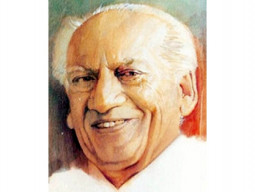
In tribute to the legendary poet Faiz Ahmed Faiz, an evening of candid conversation, poetry and a live music recital was organised by the Asian Study Group (ASG) at a local hotel.
The idea was to celebrate Faiz and commemorate his birthday which happens to fall in this month, said the ASG President Parveen Malik. A volume of Faiz’s translated works by the renowned economist Dr Mehboobul Haq, “A Withered Spring” was also available for purchase at the event.
Poet Harris Khalique and writer Shamoon Hashmi, both of whom are considered authorities on Faiz, presented some anecdotal accounts, their personal interactions with Faiz and select verses from the multi-faceted poet’s lifetime. Talat Azim of the ASG remarked that Faiz remains the most translated poet from this part of the world. She read out the translation of the poem “Nisar mein teri galliyon par aye watan (My salutations to thy sacred streets oh beloved nation)” earlier rendered by Hashmi.
Khalique related an incident of when Faiz was awarded the Lenin Prize in the category of literature in 1962. Since there was no direct flight to Moscow, the poet travelled via Karachi to Delhi and then to Moscow. While he was staying at a Pakistani diplomat’s residence, the diplomat’s young son came up to him and asked for an autograph. Fulfilling the request graciously, Faiz wrote a couplet of his verse and signed his name in Urdu.
The bewildered boy responded, saying, “Faiz Sb, my father has been telling me that you are the editor of Pakistan Times, you know good English and that you are travelling to Moscow to receive a prize and still you have given me an autograph in khansama’s (cook’s) language.” This, Khalique, maintained is the power relationship that exists between the two languages which is good neither for Urdu nor Pakistan.
While comparing the current political landscape to Faiz’s era, Khalique said the poet witnessed political depression spent over four years in jail during which he penned the poetry book, “Zinda Nama.” “Perhaps the political landscape was more challenging back then but the cultural landscape was rich, diverse and pluralistic,” said Khalique. “That has changed but it had to change. I’m not suggesting we cannot correct the course now but you don’t have to go back, we somehow have to look forward and correct the wrongs that have been committed by our political and military leadership and the intelligentsia at large,” he added.
Faiz is most relevant to us as he was the chronicler of Pakistan’s political history in poetry and what sets him apart from his contemporaries is his ideas of unity and state diversity, Khalique observed.
The evening ended on a lyrical note with live renditions of some of Faiz’s most cherished verses such as “Hum dekhenge.” The vocalist Tahir Khan was accompanied by Muhammad Javaid on tabla and Anwar Husain on harmonium as they mesmserised the audience with the soulful rhythms.
“One cannot harbour enough admiration for Faiz who voiced the frustrations of the marginalised, was one of the most prolific writers and remains an icon for all generations to come. His poetry is so layered that anyone can understand and enjoy it,” said Ayesha, an audience member and academic.
Published in The Express Tribune, February 28th, 2014.











































COMMENTS
Comments are moderated and generally will be posted if they are on-topic and not abusive.
For more information, please see our Comments FAQ